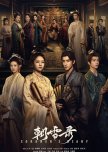
I wish it is more culturally realistic, more mind-provoking, and more dramatic.
There is no doubt that this drama has excellent production quality. The settings, costumes, music, and characters are fitting and captivating. The main and supporting characters have distinctive personalities and are very entertaining. I love to see every interaction between them. I view this drama as successful at combining mystery, romance. and light comedy. However, even after finishing all episodes, there is still a big hole in my heart.First, I'm not sure which aspects of this drama are real or fictional, especially when it comes to case-solving. This drama is excellent at incorporating elements of law and traditional medicine. It has the potential to be more intellectually engaging, but it is wasted. Repeatedly, during each case investigation and resolution, I compare the plots and storytelling to the legendary Jewel in the Palace (2003), from which I learned so much about Korean culture—its cuisine, medicine, traditional clothes, monarchy, and society. These cultural aspects are so believable, causing me to dig deeper into everything about Korea and the Koreans, and to watch more historical K-dramas.
This issue leads me to conclude that China is still far from creating a Hallyu-like wave despite its historical and cultural richness. I wonder if it is really that difficult for Chinese drama producers to incorporate authentic cultural elements into their works and help audiences become more knowledgeable and appreciative? Are the use of herbs, poison, and legal codes depicted in the drama grounded in reality, or are they merely fabricated to serve the plot? I mean, this drama is not a wuxia or xianxia where people can fly, and I know people cannot fly, so I shut by brain to enjoy it. This drama is somewhat "scientific" to serve the case investigation's believability. But things seem imaginary and heavily fictional.
Second, the cases are mostly felt rather strange to me. It is not about the incidents but how they are resolved. It is good to see how a coroner did forensic work to do an autopsy and collect evidence, and the empire's justice system works pretty well, too. They have a legal book as a reference, sufficient officers, and an investigation and testimony collection procedure. All of them should serve like pieces of a puzzle waiting for arrangement. However, the resolution often stems from mere deduction based on an insignificant, later-found hint or coincidence, throwing the previously collected pieces of information out of the window. After following one or two cases, I found that this show has the habit of spoiling the viewer by revealing the culprit through certain gestures and camera work. It makes the cases highly predictable and not enjoyable.
Third, this drama lacks emotional moments. Everything flows too smoothly, and the main characters are portrayed as perfectly capable, smart, and invincible. They never make a single mistake or show any meaningful weakness or vulnerability—traits that would make them feel more human. There are no moments of setbacks, deadlocks, or desperation, as well as moments of learning and reflecting on things beyond their control. No pivotal moments deserve rewatch. Nothing to worry about, and they bounce back far too easily. Even though people die horribly, they are safe and "protected". It is very atypical considering the world they live in. I mean, there should be a moment where efforts failed, the strong ones are injured, or get sick, and their lives are at stake. The cooperation between the main characters thus feels lacking something profound.
Fourth, the villains in this drama are disappointingly weak, lacking both intelligence and strategic cunning. The princes (Che and Qi) come across as foolish and impulsive, respectively. As antagonists, they feel too much like shallow tropes rather than compelling, formidable threats. The evil empress and consort are also the same; they are practically doing nothing throughout the episodes. There are no moments of good decision-making, considering pros and cons together, and implementing the plan into action. All of them are bad in character and thus, doomed to fail from the beginning.
This makes me compare them to antagonists in "Princess Gambit" (2025). There, we got antagonists who possess at least one admirable trait, and this makes us "love" them to be on screen. In Coroner's Diary, the problem-solving strategy of the antagonists is just killing, killing, and killing people, and leaving traces to be tracked by our leads. Had they used more political maneuvering by moving factions in court to help them, our main characters (the male lead is a military man and the female lead is a doctor) would be devastated. But it would result in a better challenge that pushes our leads to grow beyond their comfort zone of competence.
Despite its flaws, this drama is still enjoyable. However, I don’t think people would rewatch it often, as it cannot even hold a candle to the expectations of its own genre, “mystery.”

A Political Survival Drama with Brilliant Villains and a Slow-Burning Romance
I would classify Princess’s Gambit under the subgenre of political survival. It contains political drama, moral dilemmas, and a survival narrative. Because romance takes a backseat to the survival plot, it's understandable that many viewers misunderstood the drama and ended up disappointed, leading them to focus unfairly on flaws in the production and criticize a particular actress. I hope future viewers don’t fall into that problem and misjudge the drama without realizing what it truly tells. I invite you to look beyond the steamy romance and embrace the broader narrative context it offers.Not Vague Title, Informing Us What to Anticipate
First, this drama is very clear what it is about from its title. It is not vague and abstract words. We have a weak and helpless princess (played by Meng Ziyi) in the beginning. The natural questions that follow this premise are: In this situation, how will she defend herself and achieve her purpose? The title of the drama describes the story's theme well. So, we know what to expect and anticipate as time goes on, that this will involve a battle of wit, scheme, and gamble to beat the opponents/ enemies under dangerous circumstances. And it does! People may argue about the effectiveness of every choice a character made. But it is good to see how a story doesn't betray its own title.
It Defies Several Common Drama Tropes
Contrary to popular belief that this drama is packed with clichés (such as an arranged political marriage, a damsel-like princess in distress, a cold and ruthless male lead with a traumatic past, and a typical family drama with multiple wives), what we actually get is quite different:
The princess, Jiang Taohua (JTH), takes control of her destiny by breaking free from her arranged marriage and scheming her way into marrying the most powerful political figure instead. She’s a sharp, resourceful woman who manages to survive in a hostile household, facing not only the environment around her but also the danger posed by the very man she married. Interestingly, she takes on the role of a double agent. On one hand, she poses as a spy for her evil stepmother, the Empress of Beiyuan (though in truth, it's all an act). On the other hand, she’s secretly carrying out her own mission: to save her younger brother.
Meanwhile, the main male character, Shen Zaiye (SZY), the Qi's chancellor, is far more layered and complex than expected. He has a sad past, but is not haunted by any trauma. Instead, he grows as a character (from a scholarly man to a martial artist and to a politician; from a bookish idealist to a realist pragmatist). Interestingly, the story presents us with an unreliable narrative stemming from JTH's perception of himself. His household is basically a harem with a legal wife and several concubines, but all of them are political pawns of their respective noble families. So, SZY distances himself from them and never touches them. Even, he let them fight each other and observe from afar.
Well-done Couple Development
SZY's relationship with JTH evolves gradually in a positive direction despite the ups and downs. They start from (1) lethal enemies (who want to kill each other), to (2) comrades united by a shared idealism (and acknowledging each other's good side), to (3) lovers still clouded by lingering distrust, to (4) once again strangers after an angsty separation, to (5) a team helping each other for a shared cause, and to finally, (6) a genuine husband and wife devoted to each other. Some viewers cannot stand numbers (3) and (4) patiently because they want to see a lovey-dovey husband and wife immediately. But if you hold on, you will get all the reasons behind SZY's deep love for JTH: the openness toward the unwanted, the willingness to understand, the pity and empathy, and redemption. These reasons make SZY's ultimate sacrifice to help JTH so heartfelt.
For JTH, maybe, the one thing that frustrates many viewers about her is that she is so late to appreciate SZY's goodwill, accept his helping hand, and value his presence. Of course, it prolongs the plot, which is bad. However, it is not without a lesson, and Cdrama has a tradition to teach love this bitter way. This trope reminds me of the ending of TMOPB (2017) (and some other dramas), which is pretty similar! The man should sacrifice his life and go for the woman to understand his worth and treat him in a better way. So, I don't blame the director and the writer of this drama. Maybe it is a cultural thing!
Beautiful Symbolism
Liu Xueyi as SZY plays his role so well and manages to handle every change in SZY's character from the beginning to the end. SZY's pragmatic ruthlessness and humility are his way to serve the emperor patiently. Without screaming "I want revenge!" and stabbing behind the emperor's back, he seeks ways to bring back justice and fairness in a lawful manner. Interestingly, he spends his free time alone, carving a wall with the figures of houses. As viewers, we don’t understand its meaning until the very end, only to discover that it’s a physical embodiment of his deepest will. What a powerful and shocking reveal. We saw his bravery in giving a fiery argument and his last counsel to the emperor. After his purpose is fulfilled, he resigns from his post to live the life as he wishes, no longer a political pawn to control the government. He left his physical house and left the symbolic houses he had lived/ carved for ten years.
Superb Villains' Arcs
Princess’s Gambit stands out for having some of the most well-crafted villain arcs ever presented in a drama of its tier! Even, it beats The Double and Blossom. Let's compare and contrast. In The Double (2024), Princess Wan Ning is murdered in the end, Shen Yu Rong commits suicide, and the evil mother goes crazy. In Blossom (2024), the evil Empress is just demoted and exiled, the prince is imprisoned, and the evil uncle of FL dies "righteously" to protect his patron. Those are not fair ends.
In Princess's Gambit, we get a full spectrum of villain types who end up working together as their interests intersect. Their alliance feels inevitable. We know what they want, how they are thinking and feeling, and how they are scheming. Also, how all of them met their demise is so satisfying. Wugou is the victim of his stupidity. Huaijin is the victim of blind loyalty to a wrong master. The Meng family head is forced to kill himself in prison, just as he did to Huaijin. Wuyin is dead for the love he craves. Meng Zhenzhen got a pardon due to her last merit, and it resonates with her genuine care for fellow women in her family. And, Empress Lv died in a most tragic and agonizing way. These villains’ stories form a complete circle, delivering clear moral consequences. There’s a satisfaction in seeing them punished in the very ways they once wronged others. They reap what they sowed. Their character traits and choices become their downfall.
I am satisfied with this drama as it has villains with qualities comparable to ML in terms of intelligence, resourcefulness, and power. It makes the clashes interesting to watch. We don't easily know who will win this game.
Storytelling Techniques
Some viewers are disappointed because the director doesn’t take enough care in showing the process behind key choices and outcomes. Certain plot points feel abrupt, with little buildup or explanation, often delivered only through brief flashbacks. Fortunately, the flashbacks aren’t filler, but they still fall short in providing satisfying narrative depth. To some extent, this method adds suspense and shock value. However, for viewers who enjoy analyzing character motivations, tracking cause and effect, and emotionally engaging with the unfolding events, it feels lacking. The drama demands that viewers watch closely, connect scattered dots, and use their imagination to fill in the gaps. This weakens the sense of immersion and reduces the overall flow experience. Ultimately, the series falls short in its storytelling technique.
Despite the weakness above, there is also a strength: Emotion and passion. They inject a dose of sensuality into SZY-JTH interactions when they are still enemies and lovers with distrust; the push and pull between husband and wife. It is a good compensation when we don't have a proper romantic relationship between them in the early part of the story. This sparks chemistry. In later episodes, when they are strangers again, they are less physical. There are no steamy scenes or passionate kisses, yet every gesture brims with emotion. Even their silence and gazes speak volumes about what is hidden in their hearts.
Production
This drama has balanced day and night times. Fun and playful moments happened during the day. Suspenseful and grittiest moments happened at night. That is wise! The darkness, the shadows, and the light from the sun and candles also highlight the emotion on the characters' faces and add more things to the atmosphere. The costumes are beautiful. The music, despite being sometimes loud, matches the emotion of a scene. And for the places and settings, we don't see repeated Hengdian studio or any other places we usually see in Cdrama. It gives some novelty.
Unfortunately, The Hated Tropes
It is hard to believe that they still use POISON and AMNESIA as plot devices! So many Cdramas use them! About poison, it is usually used as a wicked and powerful instrument of control, to set a limitation, a line must not be crossed, or you will die. However, if we think about it more, there is always something "magical" about it which defies rationality: the poison is the most lethal, and has no cure. Or, if it does have one, it involves a rare ingredient that demands a big sacrifice or great struggle, and that ingredient is a fantastical element! We don't know who creates it or where it originates.
And then there’s the amnesia. It's a trope often used to reset everything to zero. In Princess’s Gambit, while the cause of the memory loss is understandable, the story didn’t actually need real amnesia. It could’ve been far more compelling if this commonly disliked trope were reimagined as a deliberate act of deception, turning it into a strategic move. That would’ve better showcased the princess’s cunning and reinforced her role as a calculating survivor.
In the end...
Despite its imperfections, Princess’s Gambit is a rewarding drama for those who crave something beyond formulaic romance or palace/ political drama. It offers a rich tapestry of political maneuvering, complex character growth, villains with depth, and layered moral dilemmas. Don’t let surface-level tropes or missing exposition mislead you. Watch with attention, connect the dots, and you’ll discover a story that dares to explore trust, power, and loyalty in bitter yet beautiful ways. If you're tired of dramas that play it safe, this one might just surprise you, if you give it the patience it deserves.

A drama with mind-changing power about life and love
This drama makes me worry in its every episode that tragedy would be fallen to all characters. That shows how do I care so much about them. Every character is important and has meaningful story to tell. This drama is not afraid of showing human fragility and that everyone is prone to make mistake. When the finale gives a happy and touching ending, my heart is very satisfied. This drama tells a story about life, love, and how to go through after getting hurt, making mistakes, and experiencing lost of loved one. It teaches me a lot of things.I am surprised that the story is actually so simple, but executed extremely well. The setting and its details on physical as well as cultural environment are so rich. The plot and plot-twist are engaging. And the conflict and its resolution are flawless. This drama should set new direction and trend for Chinese future drama that we can create a unique and refreshingly new story by paying attention to our reality and daily life. It brings up the romance of living in countryside and maintaining cultural tradition, as family values, and righteousness. You don't necessarily have to be rich to be happy or prestigious job and live in the city to have a decent satisfying life. Being anti-mainstream is all right. The most essential thing is how to learn to accept reality and flow flexibly with the river of life.
As a muslim viewer, I think this drama also do some justice. Muslim group as represented by Kazakh people in this drama is well depicted as part of bigger Chinese community, living together peacefully with other ethnicities like Han and Mongolian. Watching this drama is the first time I see Xinjiang and its beautiful natural features. It makes me eager to watch other series with similar genres, portraying different side of China. I recommend you to watch this. May this drama gain much recognition it deserves and much much more national and international viewers.

It has good romance, but the story is the weakest.
This xianxia drama has several strong points. First, it brought to us the long awaited pairing, Zhao Liying (as FL, Shenli) and Lin Gexing (as ML, Xingzhi), after the phenomenal Princess Agents (2017) which gave us such a disappointing cliffhanger. Second, the characterization of FL as a war general and ML as the last ancient god is so fresh. We got a non typical main female who is not bubbly, childlike, naive, and damsel-in-distress type as well as a god who is really can do something majestic and wonderful with his tremendous power. Third, this drama is very good in the department of CGI, costume, make up, setting, and worldbuilding. It is visually so pleasant to eyes and satisfying. Fourth, it shows us the perspective of common people to the events in the story, like the joy of people when Shenli and her troops won the war and the sadness of people when Shenli and others died. Also, it describes daily lives in mortal world, immortal sect, and heavenly palace. It makes the story is pretty relaxing, easy to follow, and suitable for comedy. Fifth, the story shows us how love evolves step by step from zero. It gives us the reason why Shenli falls in love to Xingyun/ Xingzhi, and vice versa. Sixth, it gives us a very happy ending. As a romance, this drama is undeniably so good.However, this drama still cannot escape the trap of xianxia tropes, therefore is unable to create new/ unique direction for Chinese fantasy story. Xianxia is a highly predictable genre. The ingredients are somewhat determined by the heaven: Three realms, power struggle between immortal sects/ divine gods and demon clans, war between good and evil, sweet romance, angsty forbidden love, evil/ pitiful/ passionate third wheeler, self sacrifice, (pseudo) sad ending, and resurrection as the definition of final happy ending. Every xianxia out there are just changing the dose, concentration, and emphasize to make their "dish" different. The Legend of Shenli is no different. It just emphasizes the sweet romance, lovey-dovey, and chemistry between FL and ML more, while decreases the dose of power struggle, angsty forbidden love, and the war of three realms, and makes the impact of the third wheelers to minimal. Plot wise, there is nothing distinctively new. Because of that, the story is so boring. It starts the same and ends similarly. If you don't watch this drama, you have nothing to lose. It is not a drama which set a higher bar for future drama.
The storyline is the weakest point of this drama. It is such a pity, because this drama has unique FL and ML introduction and relationship dynamic. The ML is not a god with pitiful backstory. He is just the last ancient god who is bored by his lonely life and very long existence. He enjoy mortal realm to experience its liveliness and playfulness. He is indifferent to things. He really has immense power, dependable, and unbeatable in every battles as he is the highest god. And, the FL is a female general. She is very strong, mature, selfless, achievement oriented, and thinking the big picture. She is fierce and bloodthirsty hero. Interestingly, deep inside her heart, she wants to be cared as a ordinary woman and to have normal life. This has been a very good story premise. BUT, this drama lacks exploration to their psychological dynamic (internal conflict) and too late to introduce the enemy to defeat and their stakes (external conflict).
The story would be very unique if they keep the initial premises and don't change the FL and ML's dispositions easily out of love (after the first moral arc), and make sure to fix every plot hole. Personally, I don't like the idea of humanization of god which is a special being. It is actually not reasonable for thousands years god to fall for merely 1.000 years female immortal, like he has never met a woman before and the FL is the only woman in the entire universe. Love makes him weak, stupid, stubborn, suffered physically, ashamed, confused, etc. Where does his wisdom from living for thousand years go? When ML dramatically froze the entire sea just to find Shenli, where does his omniscient go? He should be a transcendental being, with transcendental mission, and achieve it with transcendental love to other beings. And, when he is died due to fatal injury, it is really a problem of power scaling. Above him, there is only the Heaven which is greater in power than him. But, how come he is powerless when facing the King of Demon and dealing with the crisis in Xutian Abyss? How come he is more vulnerable than Shenli, a mere immortal and a phoenix? Is he really a god? What a fantastic being!
Also, the enemy is laughable. Just non intelligent flying black smokes going rampant in the air (miasma)! What is so fearful about that? It lacks personification and has no motive. It is created by unknown process, by a crazy power hunger immortal, yet so powerful because people said it is powerful and fearful. The furthest ability it has is just killing people or causing bruises. And Fu Sheng and Mofang (the agents behind the resurgence of miasma), how can they be that powerful and able to "kill" Shenli? What cultivation do they have or how do they train? We never know. They just exist like a decoration, to make the story has some actions and for Shenli to show off her spear play. And, it is really not good for the story because "Every hero needs a villain. Without a great villain, there are no great heroes." So, what is the point of Shenli's designation as a great war general? She just beat the villain using brute force, no intelligent maneuvering, and strategic action.
This drama indulges us so much with romance, BUT without problems to solve decently using Shenli and Xingzhi's great potentials as a war general and a greatest god in the realm. For you who love lovey-dovey couple, you might love this show purely for the romance. But, it you watch for some depth and substantive theme, I suggest you to save your time. This drama would only cause you a desperation.

A Drama with Exceptional Worldbuilding and Real-World Resonance
I don’t know how to express my satisfaction with this drama. A Moment but Forever (AMBF) has exceeded my expectations and could potentially set a new direction for xianxia (Chinese fantasy) in the future. I enjoy the story so much that I can overlook its somewhat low production quality. The story is truly a gem.AMBF shows strong points in its story, acting, and music. The OST and BGM are beautiful and add depth and nuance throughout the story. The performances of the male lead (Liu Xueyi) and female lead (Tiffany Tang) are flawless, full of subtlety, emotion, and chemistry in every on-screen interaction. They are truly talented actors who portrayed Yuan Zhong and Ji Tanyin wonderfully. I can overlook the occasional odd styling choices because the characters are so captivating to follow. The music and acting are perfect, but the most important thing we have is the story.
Xianxia is famously known for its tropes in Chinese dramas. Since Three Miles of Peach Blossoms (2017), we’ve been endlessly served stories revolving around “three lives, three worlds,” the power of love versus dark evil, and the same old plots of godhood, tribulation, and rebirth. This has made xianxia—stories of gods and goddesses—feel increasingly repetitive and lacking in creativity. AMBF arrived this year like a breath of fresh air because, for the first time, we get a story told from the perspective of mortal humans. AMBF explores the struggles of living as mere mortals in a world full of danger. I’m surprised by how relatable and relevant it feels.
AMBF explores a wide range of issues. We are presented with philosophical debates on whether humans are inherently good or evil, the origins and nature of evil and sin, the power of unconditional love, the acceptance of life as it is, the meaning of life, and—most prominently—death, as well as the struggle for peacebuilding. The discourse on death is particularly compelling, as it is mentioned and emphasized several times as a defining attribute of humanity. Death is inevitable and might be seen as a human weakness compared to demons, immortals, and gods. However, the existence of death becomes a source of "soft" power, pushing humans to grow wiser and build lasting, prosperous civilizations.
Because death is an undeniable fact, humans do not obsess over it; instead, they strive to live as fully and meaningfully as possible. They are not consumed by the pursuit of longevity like immortals who desperately seek eternal life, nor do they exist idly like gods, who, without struggle, risk becoming stagnant and purposeless. By weaving death-related themes thoughtfully into the narrative, AMBF avoids the typical tropes of rebirth and reincarnation. Instead, it offers an empowering story about coping with loss, focusing on how to move forward rather than wishing for a lost loved one to return miraculously.
Another aspect that makes AMBF especially fascinating is its incorporation of both hard and soft science into the worldbuilding. Believe me, this is extremely rare in xianxia, which typically relies heavily on magic. Worldbuilding is usually the weakest aspect of xianxia because we’re so accustomed to the same templated elements: a heavenly kingdom where most of the characters reside and a mortal world that serves merely as a place of tribulation and a stage for conflict. There’s often little exploration of what truly constitutes their world.
In AMBF, each place is explored in considerable depth, especially the human world: its structure, history and lore, culture and customs, civilization, technological blessings, and even the mundane details of daily life. Common people play a significant role in the story, not just as background figures or cameos, but as integral parts of the narrative. Through them, we gain a real sense of how this world is built and sustained. It is really a hidden gem, a fantastic creativity.
I really hope many people will take a look at this drama and enjoy how seriously excellent it is. I hope, maybe, there will be a remake with better production quality in the future, to make it a bang for a greater audience. Really, really wish for that.
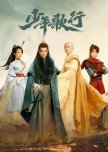
It completes my imagination of Shao Nian Ge Xing!
For a story to be adapted into various mediums (comic, animation, and live action), it definitely speaks quality. For us who read Shao Nian Ge Xing (Song of Adolescents) the novel and follow the donghua (animation series), having a live action is a real treat for fans. It is very very rare for an IP to get this opportunity. This drama itself completes my imagination about the world of Shao Nian Ge Xing. I see how it is well coordinated with the novel and donghua version, so that each version complements one each others despite several differences in some places.After completing all episodes, I am not hesitant to say it is really a superb adaptation. The worldbuilding is complex but clearly explained through the course of the story. This drama has all ingredients of a great wuxia: geographical landscapes, actions, sects, skills, and weapons, imperial politics, culture, and philosophy. There are diverse landscapes: cities, temples, and palace, mountain, jungle, river, and sea. There are actions almost in every episode which is pleasant to eyes because of good CGI. There are philosophies from Buddhism, Daoism, and Confucianism giving the story some moral weight. The Chinese cultural presentations are so rich, from music, paintings, poetries, dance, outfits, and interior design of places.
The imperial politics and the damage it caused to the jianghu is pretty complex since it involves the grudge of two generations. However, the story is able to balance external conflicts, who finally win the thrones and who finally get recognition as the best martial experts, and internal conflicts: familial love vs anger among siblings, forgiveness versus revenge among loyalists, repentance versus self-righteousness among those who did wrongdoings, solitariness versus togetherness among friends. So, the best aspect of this drama is the strong themes it holds tightly from the beginning to the end: brotherhood and friendship. This story tells a lot about love to siblings, parents/ children, and love to friends. This makes it meaningful to fans and general audience.
This drama is so loved, so it lies solid ground for future movies/ drama, for prequels and sequels.
Final thought (5/2/23)
===
This story follows the journey of the youth: Xiao Se/ Xiao Chuhe (the main character), the four guardians of Tianqi (Lei Wujie, Sikong Qianluo, Tang Lian, and Ji Xue) a.k.a his guardians, Wuxin the shameless monk his best friend, and Ye Ruoyi his advisor.
It starts uniquely as Xiao Se is portrayed as anti-hero. His back story is quite heart breaking. He was a prince and prodigy that had fallen to the lowest. After involved in Langya Mutiny, he was demoted to commoner, exiled, harmed by his enemy, and lost his martial arts). People loved and remembered him as a hero, but now he was nobody and gone missing. However, in his heart, he always desired to clear his uncle name and wanted to come back to capital city, Tian Qi. He never lost his pride and principles. He is a person with a very strong character. Xiao Se journey started from coincidental encounter with Lei Wujie, a newbie with pure heart, whose journey aimed to be the greatest expert in jianghu. Later, they both travelled together and found more friends along the roads, especially Wuxin whose life unexpectedly was related to all of them. Their brotherhood is amazing.
Throughout the story, all characters experience character development. The naive Lei Wujie finally climb the ladder of skills as well as learn about love and having cute romantic relationship with Ye Ruoyi. The strong but shy Tang Lian learn to follow his heart and his principles rather than following duty blindly. Wuxin realized that he was not alone in his journey. Sikong Qianluo stopped being a bratty and spoiled girl. Xiao Se got the most extreme character development, from nobody to somebody again as a prince and a martial artist. He was still cunning and sharp tongue, but his traits were somehow refined by his past downfall and adversities. He faced his inner demon. He became more humble and grounded.
The story and interactions between characters are funny and entertaining, but also can thrill and create suspense. I found that all character are strong and badass. Nobody is weak here, even the princes learn martial arts. Nobody is stupid, as each character is reasonable and use their intelligence to face the challenges, including the antagonists.
Personally, I don't mind with the romances, even though some audience complain it, wanting it to be just focused on pure wuxia and indifferent friendship to feeling, because no chemistries among couples. The romances are told in the novel, so it is not wise to omit it from the story. To keep the drama stay true to the novel is appreciation for the writer/ IP. As the cultural background of the story believes in the concept of Yin and Yang, romance between man and woman even in martial arts world is a good thing and needed to balance things. People cannot keep doing physical fighting, action, and getting injured or experiencing setbacks without cure and consolation. The best consolation for man is the love from woman; people naturally seek for his/her soulmate. So, it is good to have a hint of romance. This drama does better in telling romantic relationship in comparison to the donghua because it gives more screen for couples. We know how relationships start, evolve, and end among couples here, both for main characters and supporting roles. All is wrapped well.
For you who never read the novel or watch the donghua, this drama completes the donghua in several ways. The donghua is a little bit confusing at telling the background, context, and things happened in the past. This drama delivers it well so we know what actually happened to Lord Langya, the history of four guardians, the history and relationships of characters, etc. The drama also improves the pacing and sequence of events so that the storytelling is smoother. This drama also changes some parts/ adds things that are not in the novel or Donghua, which is make the story stronger. For example: It differs in the time identity of Xiao Se as a prince is exposed to his friends, when and where Xiao Se met Xiao Chong and Xiao Lingchen for the first time, who involved in Three Party Meeting of Baxiao Hall, the romance during lantern festival, how the Dark River assassin syndicate got its ends, how Xiao Se got his swords, the options given to Xiao Yu before his demise. etc. I personally hope the drama has more episode so we can see the war between Beili and Nanjue, Xiao Se versus Ao Yu, the prince of Nanjue he beat in gambling repeatedly told before, and how he won it.
The drama also moderates some depiction in the novel that are too bloody. We don't see the bloodshed in Tian Qi and how every character always thrown a mouthful of blood after getting hit. In my opinion, it is good so that the story is acceptable for younger audience and thus family friendly. I also like the details in drama showing gestures, especially the fingers movement when a character is thinking of something and their face expressions (such as in the scene when Lei Wujie telling his Insulting Sword Technique to Xiao Se, Xie Xuan, and Wushuang). Even though many people saw Xiao Se expression is emotionless, I personally saw it accurate because that is how Xiao Se should look like.
I recommend this drama for you fans of the donghua and all of you who love historical and wuxia drama. Dear fellow fans, waiting for season 3 may be long. This drama can fulfill our thirst in the mean time.
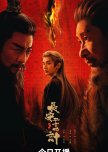
Bloody and Ruthless without Losing Moral Core
This is a drama that choose to tell about fallen emperors, about weak scholars trying to defeat an army, about a crippled general defending his nation, about a person full of revenge turning him into a terrifying character, yet conscience and mercy are still alive in his soul. For me, it is a commentary for the trend and tropes in Chinese historical dramas which are mostly stories about powerful emperors, beautiful prince and princess, and victorious heroes.Watching this drama reminds me of several older series. Comparing it to the famous Nirvana in Fire (2015), while sharing similar theme of revenge, The Vendetta of An (TVOA) has ruthlessness that is not found in the former show. It is more bloody and cunning. It is a battle in various domains, not only physical, but also psychological and political. It doesn't dwell too much on palace politics, which is refreshing for a historical drama.
And, talking about ruthlessness, it is comparable to Game of Throne, however with a strength that makes TVOA, an Asian show, more shining in my eyes: a profound moral value. Thus, every drip of blood and tears shed here has more weight. They are meaningful, not only in telling the narratives but also heartwrenchingly igniting viewers empathy and even compassionate feeling and other emotions. We watch it for the virtuous to win, for a light in the end of a long dark tunnel to keep shining, not for the thrill and sensation alone. For a drama to be able to cause such effects on viewers, for me, it is a success.
I believe a good drama can defend itself and needs not to rely itself on the popularity of a certain actor. For TVOA, the story itself is its grestest asset that would challenge futures Chinese drama. It is set a higher bar in several areas of drama making and storytelling. For characterization, we got a continuum of personality spanning from the wickest to the most innocents, they are so grey and multidimensional that even turns the villain into a hero in their story, and push the presumed hero to villainy. It is so good at playing with perspectives so that we got a very complete picture of the story and the message this drama trying to convey.
The richness of TVOS's settings is also apparent. The use of real environment with the farming field, mountain, forrest, river, and sea, the potrayals of commoners and their lives through the market, the everyday family life, add more realism to the world. When the story is telling about conflict and war, they also show the impacts on family and societal level, not only individual or personal. It speaks volume for "the luxury of normal life" where family could live together, children have their guardians around, individuals could have idle life while still thriving through their works, where people could enjoy meal without scheming for revenge!
I am so suprised on how well this drama gives voice to the commoner, the marginalized one in almost all historical dramas. They are not merely a background for the elites, cameos walking and running in the back to fill the space, but a collective character that also play some roles through their interaction with main and side characters, their responses to the ongoing situation, and to some extent, they also drive the plot in a subtle manner.
Watching this, I don't care about its lacking of romance or comedy. I don't care about rating and other quantitative measures. I don't pay heed to some harsh commentaries. It is just too phenomenal to be missed, for everything that it can offer to open my mind as an audience. Bravo to all the actors and production teams!
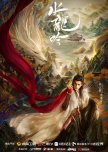
The visuals looks fake. The story is REALLY a mess. The fight is so lame.
The reality of this drama doesn’t live up to what its dramatic trailer promised. Its impression management is overblown, while in truth, many substantial aspects are neglected.For example, take the storyline. The drama provides too little background, leaving the audience unsure what the story is about, where it’s headed, or what kind of ending to expect. In episode 1, without any introduction, we’re suddenly thrown right into the middle of the plot. The background is revealed only in fragments through bits of dialogue and disjointed flashbacks.
Moreover, there’s no proper character introduction. Even by episode 18, I still find myself asking, “What exactly is Tang Lici? Who is he? Where does he come from? Where does his power originate? What does he want? What is his purpose? What is his history?” The same goes for the villains. Take Lin Yan, for example — “How close was he to Tang Lici in the past? Why does he bear such an extreme grudge, to the point of madness?” There’s no adequate explanation, which makes his character feel one-dimensional. Likewise, Gui Mudan is shrouded in enigma, yet his motives remain vague and undefined. And Puzhu, who is he? How is his relationship with Xifang Tao? Full of mysteries.
I think the producers of this drama poured too much of their budget into aesthetics, CGI, and effects, and beautifying Tang Lici and the villains. As a result, the dramatic aspects that should have been grounded in realism were poorly developed. This drama is supposed to be wuxia — but where’s the action? And when there is action, where’s the blood, the intensity, the impact of the battles? The story is set in the jianghu, yet where is the jianghu? The worldbuilding is unsatisfying. The forests and palaces look plastic. It mentions an emperor, a kingdom, this alliance and that alliance — but where are all these things, other than in dialogue? Too much reliance on dialogues to tell the story.
There are far too many unrealistic elements. For instance, how on earth does Tang Lici have such a luxurious ship? Where did it come from? Where does the power of the ship originate? And once the scene ends — where does the ship go? Likewise, A Shei’s blood supposedly has healing powers — but how, and why? Or, Shen Langhun with his shadow technique, and Chi Yun with his lightness skill. The techniques and martial arts are never shown being trained or developed. Suddenly, everyone just possesses immense power, and their clashes always make it blatantly clear who’s stronger. And why is it that in every battle, only Tang Lici gets hurt or feels the impact? The other characters merely stand around like spectators, coughing up a bit of blood for effect. And, only main characters can fly and doing magical martial arts. Others are just ants waiting to be killed.
Moreover, the dialogue is overly cryptic — confusing, full of riddles, and unclear in meaning. There are too many questions and delayed answers, which drains the drama of tension. The acting, too, is excessively dramatic. Every reaction comes with long pauses, as if the characters are thinking or processing something, but it all feels stiff and unnatural. The storyline also fails to deliver any real emotional punch. Where is the climax? Where is the downfall? There isn’t a single character I can fall in love with or feel invested enough to follow through their journey. None of them evokes sympathy, annoyance, or hatred. The humor is half-hearted. The angst is half-hearted. Even goodness is portrayed half-heartedly — and so are evil and cruelty. The romance is half-hearted too!
And, there is no substantial character development. Tang Lici is too powerful and controlling since the beginning. They are saying he is injured and going to die, but his bearing is still arrogant. Is there still a room for positive or negative changes for him? In every episode, I just saw his costumes changing, while others still wear the same outfits.
Even though this drama isn’t particularly good, even really bad in certain area, I’ll still keep watching just to see Luo Yunxi on screen. But rather than watching him dance around and dress like a peacock, I’d much rather see him in action — as a sharp, mature, composed martial artist who lets his movements speak louder than his words.

The angst is intense, hinting a sad ending. But in the end, it is a beautiful and good one!
My initial impression is this drama is too dark and cruel. I only keep watching it because I have sympathy and hope to the main character of the story, Tantai Jin/ TTJ, the devil fetus and later the Demon God (played by Luo Yunxi). I want to know what will happen to him, wishing this pitiful character would get his atonement and happiness in the end. My decision is right because starting from immortal arc and on (around episode 30), the story begin to reveal its gems. The reasons behind all events, the meaning behind all sufferings, and the moral behind the story are disclosed. All questions are answered.I am a layman on any technical aspects of drama making (such as lighting, wardrobe, editing, casting, etc). Therefore, I am able to focus on the story. And the story is the strongest aspect of this drama (followed by the acting skill of the male lead). The story is interesting because (strangely, uniquely) it takes the antagonist/ the main villain to be the central character. There are tons of dramas with perfect, heroic, and righteous main characters across Chinese drama land. Only this time, I found a drama that deviates from common tropes. I deeply appreciate and congratulate for the author, the scriptwriters, the director, and the producer for their bravery to take the risk, to bring a full of flaw character to the spotlight. And the result is a very valuable and memorable drama.
The story began with the Demon God, Tantai Jin, who is extremely powerful, super evil, and unstoppable. He brought calamity to all realms. All immortals were defeated, except the last two sects to be destroyed. They found a way to stop the Demon God by sending Li Susu (played by Bai Lu) to the past, 500 years ago where the Demon God was still a mortal human. Her missions are to destroy his evil bone (the root and source of the Demon God's power) and to kill Tantai Jin. However, this mission is full of hardship. The problem is not simple because once she knew Tantai Jin as a person, she began to understand Tantai Jin, his life and suffering. Later, she grew empathy and compassion toward Tantai Jin. And what makes this compassion is justifiable is because Tantai Jin is actually a good person. It is just fate that toys him so that he experienced unfathomable tribulation over his life. His suffering is the prerequisite for him to turn to be Demon God after his death. With this premise, we are brought to question: Will Tantai Jin become Demon God in the end? Will Li Susu be able to kill him?
What I love about the story: it serves us with a lot of irony and moral dilemma to chew, makes us question, what is good and what is evil actually? It breaks out heart with deep moral dilemma to deal with so called evil. First, it is easy to kill a villain if we hate or if we don't have any feeling or affection toward him. But, Tantai Jin is just a pitiful but very lovable character. He was full of flaw, but he is not wrong to some extents. He is willing to learn to be a good person. Therefore, we understand him and support him to survive and get happiness. To kill him as such a "good" character, is the hardest thing to accept. Killing him is the real evil thing for us. That is why, Li Susu came to the past expectedly as a heroine, but along the story in mortal arc, we saw her as the evil and cruel one due to her mission. This twist at this part is shocking.
Second, good and evil is not black and white. We see all characters in this drama are grey. The so called "normal and good" people have the capability do evil things, and the so called "monster and evil" have the capability do good deeds. For example: Tantai Jin is seen as evil, but he is actually a good and wise ruler for Kingdom of Jing. The nine-tailed fox demon (Pian Ran), Mo Nv, and even Si Ying and Jing Mie are demons, but they are also selfless lovers who are ready to self-sacrifice. Li Susu/ Ye Xiwu is seen as good, but she repeatedly betray and hurt her lover. Tantai Jin aide and bodyguard, Nian Baiyu, as well as his nurses, are all loyal but understandably can betray, too. Xiao Lin/ Gongye Jiwu is righteous, but for his country he refused to accept peace proposal from Tantai Jin in mortal arc and was willing to devilize to kill Tantai Jin in immortal arc. All immortals called themselves as righteous, but full of hypocrisy, prejudice, and hate. So, who is the valid person to uphold the truth? How to stop evil then, if the good and evil are actually intertwined?
Fortunately, in the last three episodes all questions are well answered. It started with the emergence of Ancient Demon God in Tantai Jin's consciousness the time he accepted his fate to be Demon God. He learnt the true nature of Demon God which is a permanent condition as long as there is sin in the world. Good and evil is part of karma in the world. Ancient Demon God failed to dominate his heart; he has the key to change his fate because he finally learnt what is love and how to love, not only for the person he loves, but also for all beings and realms. He accepted his fate to die willingly, he ended his life beautifully, like a butterfly. He was perished, but his legacy continues. He was remembered as a good one. All realms are in peace and beautiful. His wife and daughter lived well. The future is bright.
It is a very good ending with clear moral anchor in Chinese philosophies. The cosmic conflict in this drama is solved intelligently, not just by killing. All characters are not left in agony. Even though it is a rather bitter because Tantai Jin is died in the end, his death is a meaningful death. We audience shouldn't ask more like he should be revived, he and Li Susu should reunite and live happily ever after because it would be contradictory to the logic of the story and the world building where gods and goddesses can die. Reviving him is just making his life cheap and less impactful. Giving him a happily ever after is just like a Disney story.
To enjoy this show, I suggest you to go transcend your self and see from above, get the big picture, that the ending of this drama is just right and perfect. Not an open, sad, or even a bad one. Don't ask for perfection, because this story itself tells us that perfection is the most absurd thing in life. I highly recommend you to re-watch it and collect all beautiful things offered by this drama. Maybe you miss it at the first time. Don't get too disheartened by some flaws in terms of production and other technical aspects. It is very tolerable when you don't ask too much.

When love becomes a healing power
I watched this drama for Zhang Ruonan, the leading actress. It catches my attention that she repeatedly starred in a drama in which she plays a wounded character, such as in Love is Panacea (she played a young woman who suffered from a terminal illness) and Date with the Future (her character is a survivor of a natural disaster). This drama is no exception but has led her to a new height. She played Wen Yifan's character, who suffered trauma, abuse, neglect, and sexual harassment so well. The way she portrayed the suffering and the strength of a powerless young woman who tried to survive in the harsh world is empathizing and touching. She delivered the character seamlessly.The story itself is unexpectedly good. First, it takes human psychology seriously. The scenes involving responses to heartbreak, defense mechanisms, and trauma responses were executed naturally. It has strong sentimental nuances but doesn't fall into a melodrama. The cries and tears are controlled (suppressed and released) timely. Second, it respects the theme of love as a healing power. Love transforms people into a better version of themselves with understanding, forgiveness, unconditional positive regard, and genuine care. The villains are effectively portrayed as the antithesis of love, so we can compare and contrast things with minimum ambiguity. I like that they didn't try to "humanize" the evil people by giving them a troubled past and making them grey characters. Most evildoers deserve punishment, which should be the story's moral. Third, the relationship is burning slowly but simultaneously, full of tension and anticipation. From the first episode, we learn and know exactly about Wen Yifan and Sang Yan's love story. They just don't admit it and play along with the situation as mere roommates. The moment they realize their love, it is so monumental. The scenes of recognition were written poetically with some parallelism. Everything becomes well-rounded in the end.
It also gave us a strong message about social justice, women empowerment, and equality among people in society. This drama is packed with social criticism and reminders.
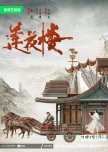
A perfect heroic tragedy wuxia
It is 10/10. Solid in every aspect of story telling. Although it follows typical successful wuxia tropes, it doesn't lose originality, novelty, and poetic quality.It follows a similar pattern we saw in dramas such as Nirvana in Fire (2015) and The Blood of Youth (2022) which focus the story on one central figure, the tragic hero, and his struggle to find the truth. Mysterious Lotus Casebook (MLC) starts from a downfall and ends with tragedy. We starts from zero and in the end, all return to zero again, creating a full complete circle. Our hero lost everything: his power, skills, fame, status/ position, and friends/ followers. He was defeated by his enemies and by his own mistake. When he was in a grave danger, a bikhu saved his life and he was reborn. He found new purpose of life and lived a humble and wiser life with new identity and changed personality. Everything is seemingly normal again, but a scar from the past forced him to return to the jianghu and involved in the conflicts. He found new friends and gain various supports to fulfill his mission. He was successful after so many hardships. He regained his former glory. However, his righteousness drove him to the path of self-sacrifice for the greater good and for the people he loved. In the end, he let go everything with a content heart. He died peacefully, and was loved by everybody.
The strongest aspects of MCL is first, the characterization of the main character, Li Lianhua. His development is so clear and flows naturally. We easily understand why he become or does this and that. He is a very positive and mature person who learns from mistakes and gains wisdom. The past is not turning him into a person with psychological issues. He is without emotional baggage so that he is able to stay firm when confronting people from his pasts. When he was confronted by his past lover, Qiao Wanmian, his sadness is there, but he stayed level headed. When watching this particular scene, I was so afraid that the story would follow the romance tropes where the male cannot resist his feeling and rebuild the romantic relationship. Or, during the marriage scene, the male usually is burnt with jealousy, and use the only chance to cure the female, to show romantic gestures. Gratefully, it is not. Other thing is the consistency from the start to the end, not only for Li Lianhua, but also for the other male main characters. Their personalities are different to each other, but their relationship is so harmonious, thus enjoyable to watch. They don't make stupid moves and every act is effective.
Second, the amazing plot twists. MCL is the drama that should be watched patiently with open and clear mind. Don't rush to know the ending of each case and of the overall story. Protect your viewing experience from spoilers, because it definitely will ruined the twists and thrills. The first part of MCL (episode 1 to 20-30) are basically detective story. They are solving mysteries by following clues and leads. Not knowing or understanding many things in the beginning to the mid part of the case are normal to bear, and in the end we will certainty get the explanation. Just wait and see. The drama is very skillful at when to close and disclose important information for the viewers. We, viewers, are "cheated", believing false truth, and by the time everything is finally revealed, it feels shockingly great. It is really not like most dramas that place viewers as know-all-things so that we are becoming impatient watching clueless characters in screen. The drama is very careful at telling the past events and the flashbacks are contained in character perception or memory. So, we understand the story from the character's interpretation of that event. Meanwhile, the past facts are told through dialogue between characters, documents, and relics.
Third, the mixed genre is so good. It is a wuxia that is laden with action and sword plays. It is a tragedy, but full of comedy. However, it is also a mystery story with a suspense, horror, and gore. When they are exploring a tomb, a cave, underground facilities, or a body of deceased, with minimal lights, it is so scary. When they meet the zombie, ghosts, and the beast, my heart beats so fast. This drama has balance day and night scenes. When it should be scary, it is set at night. When it should by funny, it is on broad day light. It has romance (mature love), brotherhood, family, and companionship. It has moment of togetherness and adventure as well as a moment of solitude and self-reflection. The evil people are evil without white washing them with "good" humane motive. The jealous person is jealous. The greedy is greed. The crazy is crazy. No excuse. No feeling sorry. We don't mix the good and the bad. The previously evil or bad person becomes good in our eyes after they experience certain events in the story, not because of the subjective experience or pitiful past that begs our sympathy. It is good for us not knowing about the royal story behind why Jiao Liqiao is crazy, why Shan Gu Dao is jealous and cruel, etc. It is on their character, not circumstances. They are bound to received punishment as their retribution/ karma.
Those are things that make this drama stands out, IMO. I don't find any serious weakness. Of course, sometimes the CGI is not perfect, the performance is somewhat a bit lacking, the mobile house is weird (look small from the outside, but spacious inside), etc. We can overlook those and enjoy the story itself. It is so good, lets watch and re-watch!
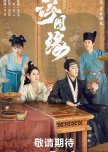
Confusing genre dissappoint expectation.
The trailer of this drama last year created a hype among Dylan Wang's fans, me included. We saw palace setting, unusual starting point for a revenge story, some actions, and how a powerful eunuch confronted corrupt officials bravely. I personally expected that it would be a kind of a serious political historical drama. I was really suprised knowing this drama falls into comedy and romance category.I think, it is okay. Romantic and comedic drama is not bad, as the story is quite funny in the beginning. I expected it would be a kind of a warmhearted story, beautiful, and touching. A story that makes you fall in love with the power of love. Love can destroy any barriers as we found forbidden pairings here that somehow makes us understand why this drama initially titled Forbidden Love: Xiao Dou (a fake eunuch) and Bu Yinlou (a consort), Xiao Dou and Rong'an (an empress), Bu Yinlou (ex concubine of former emperor) and Murong Gaogong (the emperor), and Wanwan (emperor's sister) and that Yuwen guy (emperor's enemy brother).
However, the story turns out to be psychological with some degree of violence and madness. The theme of this drama, dissappointingly: Love drives you crazy, turns you into rebel and makes you break social norms and morality. Really, unchained love. It is not meaningful at all. Its romance and comedy is not sweet anymore in the front of such dark story. So, the story is the weakest of this drama, IMO.
I know some people watch this because of Dylan Wang is the star. Me is not exception. But, the essence of watching drama is not to see some actors and visuals, but mainly to enjoy stories and have fun. The acting of all actors is good, but I hope their talents can be used for a good story, too. The music is not so good. That comedic/ funny backsound is out of place frequently. When the course of event turns serious and emotion is depressing, why they put comedic music there (such as in episode 34). I cannot laugh at all.
The only positive thing in this drama is the acting. But, it is not enough for this drama worth our time to rewatch it.

I watch this for high-quality romance, storytelling, production, and HAPPY ENDING.
No drama works without tropes. Most use at least one or two familiar templates, such as revenge, slow-burn romance, rebellion, or palace intrigue. This drama is no exception. However, it excels through its high-quality production and compelling storytelling for romance and palace politics. I especially love how it leans toward realism and sociological storytelling, and also allows us to process the emotions it evokes in a less dramatic yet still touching and moving way.I love every aspect of this drama.
Music: The opening theme is my favorite. Its gentle, warm melody touches my heart — melancholic yet intense — evoking both a romantic sense and the struggle to protect loved ones. I never skip the opening.
Production: The production quality is undeniably top-notch. The portrayal of natural, societal, and cultural elements feels poetic and harmonious, enhanced by thoughtful color tones and lighting.
Setting: It seems they filmed in various new locations, as I didn’t notice many of the “overused and familiar buildings” often seen in C-drama productions. This choice adds freshness and richness to the setting.
Costumes, Accessories, and Decor: The attention to cultural details is remarkable. Every character, from commoners and merchants to military figures, nobles, and royalty, reflects the era’s social hierarchy through meticulously designed outfits and accessories.
Storytelling Technique: I appreciate how effectively they use non-linear narratives. The transitions between past and present events are smooth and meaningful, with no unnecessary fillers. Flashbacks provide crucial clues and fresh perspectives, enriching the story. Additionally, the inclusion of “what-if” scenarios and the known alternative endings create a sense of hope for a happy conclusion. This hope makes the comedic and lighthearted moments more enjoyable and emotionally rewarding, as I know they won't be useless in the end.
Characterization: The FL and ML steal my heart because I like them instantly from the beginning. Shou Gu/ Dou Zhou is a tough, smart, pragmatic, adaptive, sociable, and efficient woman. She is also knowledgeable and resourceful. Her career as a businesswoman and a house manager makes sense. We know clearly how she climbs the ladder of success. Song Mo is a strong and loyal military man with firm integrity. He is the hero, the leader, and the backbone of the dynasty. He is ruthless sometimes, but he is also calm. He is not the type of man who would turn weak and stupid because of love. I love how they are already soulmates from the beginning, and their wedding and life as husband and wife are a big part of the story. It makes the romance more beautiful and affectionate. They also cooperate and communicate well, showing us how a healthy relationship should be.
Conflict: While not the strongest aspect of this drama, I still find it highly enjoyable. The internal conflicts might be limited, but the external ones are quite compelling. Revenge is a common theme in C-dramas, but what sets this drama apart is how the FL and ML resist the urge to seek vengeance. Instead, they choose patience and navigate their struggles with integrity. They live righteously while protecting themselves and standing against their enemies. I appreciate how the story shows that fate can be reshaped gradually by making the right decisions, even in seemingly small aspects of life and self. Additionally, I love how this drama takes a more sociological approach to explain the nature of the conflict among parties, families, and individuals. Everyone is under the control of social norms, and it affects how they make decisions and solve problems. The hypocrisy regarding women is interesting: Women are not equal to men and their life is controlled by men/ family, yet men are so dependent on them. Independent woman is frowned upon, yet interesting for greedy men.
This drama has a good message for us. Whether you watch it for the romance or else, you get a high-quality story that won't disappoint you. It doesn't only entertain us, but also gives us a chance to celebrate something in the end.

A cultivation story with powerful metaphor about humanity, mortality, and purpose
Xianxia drama is not a new thing to us, to the point that they are highly predictable. We have enjoyed various similar dramas before with the same composition involving cultivation, martial arts, magic, power leveling, immortality, godhood, righteousness versus evil, etc.. Characters like Han Li are plentiful, for example, Tang San in Douluo Continent (2021), Ning Que in Ever Night (2018), and even Xiao Se in The Blood of Youth (2023). We already know how the main character will end up: becoming the strongest among people. One thing that makes The Immortal Ascension (TIA) stand out is TIA takes the perspective of a mortal striving to attain immortality. A bottom-up view of the vast world where the story unfolds feels very fresh and adventurous.So many things are praise-worthy in TIA, I won't repeat them in great detail for you. The cast is perfect, especially Yang Yang. He is very suitable for playing Han Li. The music, the opening and ending OSTs, are great. The game-like visuals for battle scenes, magical creatures, artifacts, place and setting, etc, are so eye pleasing. The way the story is structured is easy to follow, fast-paced, and thought-provoking, with quality dialogue. TIA has clearly set its themes and premises: (1) You were once a mortal. Don't forget that. (2) The world is vast. You must see that. (3) You are weak. You must be more tactful and fully prepared. TIA is about becoming an adventurous, high-achieving, and adaptable person without losing one’s humanity. Because of this, it is perfectly crafted as a character-driven story. We can closely observe Han Li’s changes and growth, and it resonates with us as the audience, who see reflections of our own struggles to become the best version of ourselves.
However, after finishing all episodes in this season, I have some worries to share about future installments. Will the director dare to take the risk of diverging from the manhua/ donghua version while maintaining the established premises, in order to further explore human issues with this story as a reflection? This drama should answer at least one question: If you have already reached the peak after all the struggles and sacrifices, what would make you remain human? The antagonists already show us the opposite: they cease to be human after gaining power, knowledge, and status. With great power, they abuse it and oppress the weak. With knowledge and so-called enlightenment, they turn their backs on the world and the suffering of others. With status, they build rigid structures to prevent others from ever reaching the peak. So, what should a protagonist be like? I want a whole portrayal of a hero who is not only triumphant on the battlefield, but also has the wisdom to write a better history for mankind.
I believe, cultivation stories can be powerful metaphors about humanity, humility, mortality, and purpose, yet too often they stop at power escalation and fan service. TIA Season 1 already shows us 50% of this potential. It is a meaningful story that resonates beyond its genre. People should see these "intellectual gems". TIA is not just another flashy xianxia power fantasy.
For Season 2 in the future, I hope this drama does not abandon the human aspect of becoming an immortal, for it is not only about the sense of justice in the face of oppression. It is also about valuing life—the everyday struggles, love, and relationships—despite the weakness and inevitability of death. I believe life is not only about a man's goals. There should be a righteous "why" behind the power cultivated. Since no one in the real world can truly become an immortal or a god, I hope this drama does not dwell too much in the fantasy realm or become obsessed with power leveling to the point of impossibility. Otherwise, this drama will be nothing more than a typical show, rather than a story that truly resonates.

Fated Hearts is the true legend of female general this year.
I watch this title for two reasons. One, Li Qin. It is wonderful to see her playing a strong female character again. I was captivated by her acting, for example, in Princess Agents (2017), where she played a spoiled princess who fell into the abyss of revenge. Second, the female general genre, which is a disappointment after "that" legendary one this year. Imagine, with a similar episode 1 depicting "betrayal", "falling from a cliff", and "amnesia", Fated Hearts has stronger direction and storytelling, so that even the hated tropes can become very interesting and engaging. Thus, I know, picking this drama is a good choice for quality entertainment.The best things to note about this drama are:
First, rich and deep characterization. Each main and primary supporting character has a full explanation of who they are and how they turn into a "different" person throughout the story. The beginning, process, and ending of their growth, whether in a positive or negative direction, are smoothly described without gaps. From enemies to lovers, from lovers to enemies. All is a complete circle with a clear closure. We can understand them very well: their personalities, temperaments, thought processes, decisions, and actions.
We have the first prince of Susha, Feng Suige, who is righteous, brave, fierce, and full of rage; the best archer of Jinxiu, Fu Yixiao, who is calm, mature, free-spirited, and thoughtful. The two are a perfect pair in both fighting and love, with the strong aura of battle-hardened generals. And Princess Xiyang, who is young, strong-willed, but naive; Xia Jingshi, the handsome first prince of Jinxiu, who is treacherous, calculative, and cold-blooded; and Xia Jingyan, the emperor of Jinxiu, who is morally bankrupt, crazy, but kind. These three are tangled in a complex romance that ended in a perfect tragedy. Nobody gets what their hearts desire most.
Second, theme and premises. The story is set in a simple, fictional world, so not much prior knowledge is required to grasp the backstory. There are two kingdoms at war with each other. In the peak of their conflict, the tides turned in an unexpected direction due to a single arrow. Fu Yixiao's amnesia serves as a literary device for telling a story of "rebirth to a new person", which transforms the events. The subsequent story follows the paths of revenge for every character and the answers they receive. The killing and blood are scattered almost everywhere. The law is simple: power and loyalty, hierarchy and authority, dictate what is right and wrong.
This drama explores the brutal nature of human beings, particularly their vengeful tendencies. There is no preaching on kindness, peace, love, and the virtue of forgiveness, which is often found in historical dramas. The rules for morality are simple: If you hurt others, you will pay double for that. No room for pity and mercy for traitors. Everybody gets their share of punishment, whether in the form of regret, guilt, loss, hurt, or death. And, everybody gets their lessons, even though not all of them have the opportunity to atone for their sins.
Third, the realism in storytelling. I appreciate that Fated Hearts remains grounded in the reality of war. Civilians and soldiers are often sacrificed by the elites for power. War creates suffering and a generation of orphans who find solace in the bonds of brotherhood. Once they serve those with power, but they grow up learning the truth and fight to protect the civilians and comrades. They learn from betrayal and form a better alliance with the righteous one. Despite primarily telling a story of conflict, this drama also reveals the ingredients of peacemaking. Even though the peace period is only briefly mentioned in the epilogue, our imagination of what will happen beyond the happy ending is clear. It is a very satisfying, happy ending.
Fourth, quality in production. Fated Hearts is not a wuxia drama, but its fighting scenes are all well-choreographed and compact. Every movement demonstrates strength, swiftness, and detailed impacts. Every clash is bloody and creative. My favorite is the fight between Fu Yixiao and Xiao Weiran in the dark, narrow alley. The spark from their swords is so dramatic and beautiful. Other than the fight scene, the director also handles emotional scenes very well. The setting of cities and forests is are bit lame, but sufficient for telling the story. Amazingly, emotions and the heaviness of situations are conveyed through diverse ways, not only facial expressions: from teary red eyes, clenched fists, and tense jawlines, to tone and line deliveries, inner voices, flashbacks, the spatial arrangement, the camera angle, and even the creative use of light and shadow. The background music is sometimes repetitive, but it fits the nuances.
Fifth, we have many rewatchable, beautiful moments between Fu Yixiao and Feng Suige. Their chemistry, both during the period when they are enemies and after they become lovers, is strong. It is wonderful to see their interactions, banters, cooperation, and fights. They are not afraid to touch, hug, kiss, and show care and love. It is we who watch them (including Lu Ke and other battalion members) who are embarrassed. The best thing is: no love triangle, no third wheel, no misunderstandings, no miscommunications, no separation for your sake, no silence to conceal "I don't want to hurt you, so you'd better not know", no overly lovey-dovey or comical moment, and nobody tries to prevent their love. All people who know them support them. Their love is straightforward without detour.
I am so satisfied with this show. I urge you to try, as I am planning to rewatch myself.

 1
1



